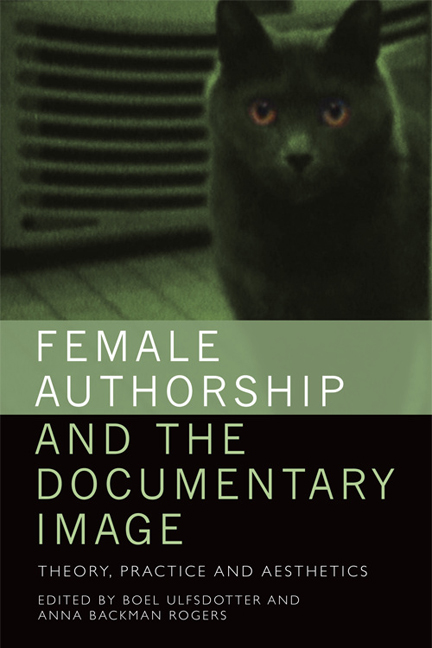Book contents
- Frontmatter
- Contents
- List of Illustrations
- Notes on the Contributors
- Foreword
- Introduction
- PART ONE DOCUMENTARY PRACTICES
- PART TWO DOCUMENTARY THEORIES
- PART THREE FEMALE AUTHORSHIP AND GLOBAL IDENTITIES
- ‘Being a Woman Documentary Maker in Taiwan’ – An interview with Singing Chen and Wuna Wu
- Select Bibliography
- Index
1 - Women in the Director’s Chair: The ‘Female Gaze’ in Documentary Film
Published online by Cambridge University Press: 05 May 2021
- Frontmatter
- Contents
- List of Illustrations
- Notes on the Contributors
- Foreword
- Introduction
- PART ONE DOCUMENTARY PRACTICES
- PART TWO DOCUMENTARY THEORIES
- PART THREE FEMALE AUTHORSHIP AND GLOBAL IDENTITIES
- ‘Being a Woman Documentary Maker in Taiwan’ – An interview with Singing Chen and Wuna Wu
- Select Bibliography
- Index
Summary
A woman's vocabulary exists, linked to the feminine universe. I feel this occasionally in that I am inspired by a certain number of attractions, subjects which always draw me rather more than they would if I were a man … I don't want to make feminist cinema either, just want to tell women's stories about women.
Agnès VardaINTRODUCTION
This chapter examines the concept of a ‘female gaze’ in documentary film with specific consideration of the work and viewpoints of women directors. I acknowledge every director is an artist in her own right, and I make the initial cautionary note that women directors make every kind of documentary. The aesthetic approaches, individual experiences and films of women directors are as diverse as their individual life situations and the cultures in which they live – so there is no implication that women are a homogenous or singular group (and gender is, of course, only one aspect of any individual's identity). Whilst acknowledging difference between women filmmakers, and conceding that any director would only be properly understood through her films and the world/s each woman constructs and represents, this chapter examines whether a film, as a creative artefact, is affected by the fact that the person making the film is biologically female and whether women directors feel that their gender has had any influence on their filmmaking. This has been compiled using data (including numerous interviews), mostly gathered in November 2014 at one of the most important festivals on the global documentary calendar: The International Documentary Film Festival Amsterdam (IDFA).
In what follows, the key markers of a ‘female gaze’ in documentary film are discussed. These markers could potentially be found in the work of male directors and not found in the work of some women directors. I acknowledge that there are likely to be exceptions and therefore I am framing these observations as tendencies. However, it is the argument of this chapter that they are most commonly found in the work of women, particularly in combination, and that a ‘female gaze’ is a product of female gender. This chapter offers ways of understanding the ‘female gaze’ and examines the question of whether there is evidence that gender influences the work of female documentary filmmakers.
- Type
- Chapter
- Information
- Female Authorship and the Documentary ImageTheory, Practice and Aesthetics, pp. 9 - 21Publisher: Edinburgh University PressPrint publication year: 2018



